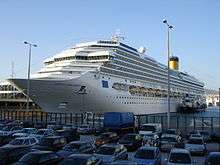Costa Concordia
Costa Concordia (Italian pronunciation: [ˈkɔsta konˈkɔrdja]) was a cruise ship operated by Costa Crociere. She was the first of the Concordia-class cruise ships, followed by similar ships Costa Serena, Costa Pacifica, Costa Favolosa and Costa Fascinosa, and Carnival Splendor built for Carnival Cruise Line. When the 114,137 gross tonnage (GT) Costa Concordia and her sister ships entered service, they were among the largest ships built in Italy until the construction of the 130,000 GT Dream-class cruise ships.
Costa Concordia in Mallorca (28 September 2011) | |
| History | |
|---|---|
| Name: | Costa Concordia |
| Owner: | Carnival Corporation & plc |
| Operator: | Costa Crociere |
| Port of registry: |
Genova, |
| Route: | Western Mediterranean |
| Ordered: | 19 January 2004 |
| Builder: | Fincantieri Sestri Ponente, Italy |
| Cost: | €450 million (£372 million, US$570 million) |
| Yard number: | 6122 |
| Launched: | 2 September 2005 |
| Christened: | 7 July 2006[1] |
| Acquired: | 29 June 2006 |
| Maiden voyage: | 14 July 2006 |
| In service: | July 2006 |
| Out of service: | 13 January 2012 |
| Identification: |
|
| Fate: | Capsized and partiallly sank in 2012 off Isola del Giglio, Tuscany. Salvaged in 2015 and subsequently scrapped. |
| Status: | Scrapped in Genoa, Italy |
| General characteristics [2] | |
| Class and type: | Concordia-class cruise ship |
| Tonnage: | 114,147 GT |
| Length: |
|
| Beam: | 35.50 m (116 ft 6 in) |
| Draught: | 8.20 m (26 ft 11 in) |
| Depth: | 14.18 m (46 ft 6 in) |
| Decks: | 13 |
| Installed power: |
|
| Propulsion: |
|
| Speed: |
|
| Capacity: | 3780 passengers |
| Crew: | 1100 |
On 13 January 2012 at 21:45, Costa Concordia struck a rock in the Tyrrhenian Sea just off the eastern shore of Isola del Giglio. This tore open a 50 m (160 ft) gash on the port side of her hull, which soon flooded parts of the engine room, cutting power from the engines and ship services. With water flooding in and the ship listing, she drifted back towards the island and grounded near shore, then rolled onto her starboard side, lying in an unsteady position on a rocky underwater ledge.
The evacuation of Costa Concordia took over six hours, and of the 3,229 passengers and 1,023 crew known to have been aboard, 32 died. Francesco Schettino, the ship's captain at that time, was subsequently found guilty of manslaughter, causing a maritime accident, and abandoning his ship.[3] The wreck was salvaged three years after the incident and then towed to the port of Genoa, where scrapping operations began.[4]
Concept and construction
Costa Concordia was ordered in 2004 by Carnival Corporation from Fincantieri and built in the Sestri Ponente yard in Genoa,[5] as yard number 6122.[6] At the vessel's launch at Sestri Ponente on 2 September 2005,[7] the champagne bottle, released by model Eva Herzigová, failed to break when swung against the hull the first time, an inauspicious omen in maritime superstition.[8] The ship was delivered to Costa on 30 June 2006.[9] It cost €450 million (£372 million, US$570 million) to build.[10] The name Concordia was intended to express the wish for "continuing harmony, unity, and peace between European nations."[11]
Description
Costa Concordia was 290.20 metres (952 ft 1 in) long, had a beam of 35.50 m (116.5 ft) and drew 8.20 m (26.9 ft) of water. She had a Diesel-electric power plant consisting of six 12-cylinder Wärtsilä 12V46C four-stroke medium-speed Diesel generating sets with a combined output of 76.6 MW (102,780 hp).[12] These main generators provided power for all shipboard consumers from propulsion motors to hotel functions such as lighting and air conditioning. The ship was propelled by two 21-megawatt electric motors coupled to fixed-pitch propellers.[13] Her design service speed was 19.6 knots (36 km/h; 23 mph),[6] but during sea trials, she achieved a speed of 23 knots (43 km/h; 26 mph).
Layout
Costa Concordia had 13 public decks, each named after a European state. Deck 1 was the lowest:[14]
|
|
Amenities
Costa Concordia was outfitted with approximately 1,500 cabins; 505 with private balconies, and 55 with direct access to the Samsara Spa, which were considered Spa staterooms; 58 suites had private balconies and 12 had direct access to the spa. Costa Concordia had one of the world's largest exercise facility areas at sea, the Samsara Spa, a two-level, 6,000 m2 (64,600 sq ft) fitness center, with gym, a thalassotherapy pool, sauna, Turkish bath and a solarium. The ship had four swimming pools, two with retractable roofs, five jacuzzis, five spas, and a poolside movie theatre on the main pool deck.[15] There were also five on-board restaurants, with Club Concordia and Samsara taking reservations-only dining. There were thirteen bars, including a cigar and cognac bar and a coffee and chocolate bar. Entertainment options included a three-level theatre, casino, a futuristic disco, a children's area equipped with video games and a basketball court. She also had aboard a Grand Prix motor racing simulator and an internet café.[16]
Accidents and incidents
2008 bow damage
On 22 November 2008, Costa Concordia suffered damage to her bow when high winds over the Sicilian city of Palermo pushed the ship against its dock. There were no injuries and repairs started soon after.[16][17][18]
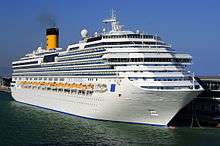
2012 grounding and partial sinking

On 13 January 2012, under the command of Captain Francesco Schettino, the Costa Concordia departed Civitavecchia, the port for Rome, Italy, on a 7-night cruise. At 21:45 local time (UTC+1), in calm seas and overcast weather, she collided with a rock off Isola del Giglio (42°21′55″N 10°55′17″E), on the western coast of Italy about 100 km (62 mi) northwest of Rome.[19][20] A 53-metre (174 ft) long gash was made in the port-side hull, along 3 compartments of the engine room (deck 0); resulting in power losses, leading to a loss of propulsion and loss of electrical systems, which crippled the ship. Taking on water, the vessel listed to the port side. Twenty-four minutes later, strong winds pushed the vessel back to Giglio Island, where she grounded 500 m (550 yd) north of the village of Giglio Porto, resting on her starboard side in shallow waters, with most of her starboard side underwater.[21][22][23]
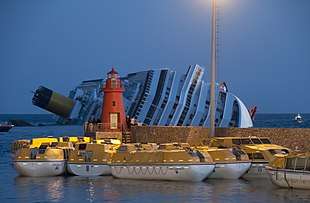
Almost half of the ship remained above water, but it was in danger of sinking completely into a trough 70 metres (230 ft) deep.[24] Despite the gradual sinking of the ship, its complete loss of power, and its proximity to shore in calm seas, an order to abandon ship was not issued until over an hour after the initial impact. Although international maritime law requires all passengers to be evacuated within 30 minutes of an order to abandon ship, the evacuation of Costa Concordia took over six hours. At the time, she was carrying 3,206 passengers and 1,023 crew members.[25][26] The accident resulted in 32 fatalities.[27][28] The body of the last missing person, Indian crew member Russel Rebello, was recovered on 3 November 2014.[29]
Salvage
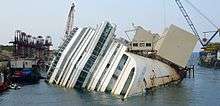
An initial assessment by salvage expert company Smit International estimated that the removal of Costa Concordia and her 2,380 tonnes of fuel[30][31] could take up to 10 months.[32] Smit advised that the ship had been damaged beyond the hope of economical repair and recommended it be written off as a constructive total loss. Smit was soon contracted to initially remove only Concordia's fuel.
During the fuel removal operation, Smit reported that the ship had shifted 60 cm (24 in) in the three weeks since her grounding, but that there was no immediate prospect of her breaking up or sinking deeper.[33] Removal of the fuel from the various fuel tanks distributed throughout the ship was completed in March 2012, later than Smit's initial estimates. This cleared the way to arrange for the ultimate salvaging and scrapping of the ship.
On 17 September 2013, Costa Concordia was brought to a vertical position through a parbuckling procedure.[34][35] The cost for salvaging the ship increased to $799 million.[36] In addition, the ship had suffered severe hull deformations in two places. Titan Salvage, the company directing the salvage operations, estimated that the next phase of the salvage operation would be completed by early-to-mid-2014. After this "floating" operation, the ship would be towed to a salvage yard on the Italian mainland for scrapping or "breaking".[37]
On 14 July 2014, work commenced to refloat Costa Concordia in preparation for towing.[38] At this point, the costs had risen to €1 billion. Including tow cost, €100 million for the ship to be broken up for scrap and the cost of repairing damage to Giglio island, the estimated final cost was expected to be €1.5 billion ($2 billion).[39][40] On 23 July, having been refloated, the ship commenced its final journey under tow at a speed of 2 knots (4 km/h; 2 mph), with a 14-ship escort, to be scrapped in Genoa.[41][42] It arrived at port on 27 July, after a four-day journey. It was moored to a seawall at the port, awaiting dismantling processes.[43][44]
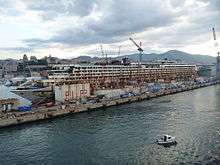
On 11 May 2015, following initial dismantling, but still kept afloat by the salvage sponsons, the hull was towed 10 miles (16 km) to the Superbacino dock in Genoa for removal of the upper decks.[45] The last of the sponsons were removed in August 2016 and the hull was taken in to a drydock on 1 September for final dismantling.[46] Scrapping of the ship was completed on 7 July 2017.[47]
In popular culture
In 2010, Costa verde provided the setting for Jean-Luc Godard's film Socialisme.[48]
In 2011, U.S. poet and singer Patti Smith wrote and recorded parts of her album Banga aboard the ship. The CD booklet includes photos taken of Smith and her band during their cruise.
On 11 April 2012, a documentary broadcast in the United Kingdom, titled Terror at Sea: The Sinking of the Costa Concordia, and another first broadcast on Channel 4, titled The Sinking of the Concordia: Caught on Camera, featured footage recorded by the passengers and crew.
On 14 July 2012, a documentary titled Cruise Ship Disaster: Inside the Concordia, was first broadcast on the Discovery Channel, CNN Presents: Cruise to Disaster, first broadcast by CNN[49] and another, titled Inside Costa Concordia: Voices of Disaster, was first broadcast by the National Geographic Channel.[50] The season 39 Nova episode "Why Ships Sink" discusses the sinking of Costa Concordia.[51] A later Nova season 42 episode "Sunken Ship Rescue" featured the salvage effort and race to refloat and remove the badly damaged Costa Concordia from the accident scene before the ship could break apart, risking an environmental catastrophe.[52]
On 15 February 2013, ABC's 20/20 aired a special on the sinking and interviews with the survivors following the engine fire on Carnival Triumph.[53]
In Paolo Sorrentino's 2013 film The Great Beauty, the wreckage of Costa Concordia is featured.[54]
On the 2016 album Teens of Denial, "The Ballad of the Costa Concordia", written by Will Toledo from indie rock band Car Seat Headrest, uses the disaster as a metaphor for a personal breakdown.[55]
References
- "Eva Herzigova to be the Godmother of Costa Concordia". freesun.be. 21 June 2006. Archived from the original on 17 January 2012. Retrieved 20 January 2012.
- "Costa Concordia (9320544)". Leonardo Info. Registro Italiano Navale. Retrieved 16 October 2012.
- "Concordia skipper's sentence upheld". BBC News. 31 May 2016. Retrieved 25 November 2018.
- "Costa Concordia wreck enters Genoa port for scrapping". BBC news europe. BBC. BBC. 27 July 2014. Retrieved 27 July 2014.
- "Costa Crociere Orders A New Ship From Fincantieri With An Investment Of Around 450 Million Euros" (Press release). Fincantieri. 19 January 2004. Retrieved 2 September 2011.
- "M/S Costa Concordia". Fakta om Fartyg (in Swedish). Retrieved 14 January 2012.
- "Costa Concordia, The Largest Italian Cruise Ship, is Launched in Genoa" (Press release). Fincantieri. 2 September 2005. Retrieved 2 September 2011.
- Levy, Megan (16 January 2012). "Cursed Concordia 'born bad, ended up worse'". The Sydney Morning Herald. Retrieved 17 January 2012.
- "Costa Crociere Takes Delivery From Fincantieri Of The New Flagship Costa Concordia" (Press release). Fincantieri. 30 June 2006. Retrieved 2 September 2011.
- "Italy cruise ship Costa Concordia aground near Giglio". BBC News Online. 14 January 2012. Archived from the original on 14 January 2012. Retrieved 14 January 2012.
- "Malta on new liner's itinerary". The Times of Malta. 19 September 2005. Archived from the original on 15 January 2012. Retrieved 15 January 2012.
- "Costa Concordia 3,780 Berths, Cruise Vessel, Built 2006", TradeWinds
Ship data from: Clarkson Research Services Limited, retrieved 28 January 2012 - Generazione di Energia A Bordo di Navi da Crociera (PDF). Cetena. p. 7.
- "Costa Concordia deck plans" (PDF). ATC Cruises Ltd. Archived from the original (PDF) on 30 October 2012. Retrieved 30 December 2012.
- "Company Profile". Costa Crociere dba Costa Cruises. 2011. Archived from the original on 8 July 2011. Retrieved 2 September 2011.
- "At least 3 dead as cruise ship runs aground; captain arrested". The New York Post. The Associated Press. 14 January 2012. Archived from the original on 18 April 2012. Retrieved 30 December 2012.
- "Cruise liner damaged after leaving Malta". The Times of Malta. 23 November 2008. Retrieved 12 January 2012.
- "Costa Concordia search operation resumes (underwater video)". BBC News Online. 12 January 2012. Retrieved 21 January 2012.
- Gaia Pianigiani (22 January 2012). "Costa Concordia May Have Had Unregistered Passengers". The New York Times. Retrieved 26 January 2012.
- John Hooper (24 January 2012). "Costa Concordia captain not solely to blame, says prosecutor". The Guardian. Retrieved 26 January 2012.
- "Naufragio al Giglio, tre morti annegati Fermati comandante e primo ufficiale, Corriere de la Sera", Corriere della Sera (in Italian), 14 January 2012, retrieved 30 December 2012 Confirms that vessel was holed.
- Christopher Book (21 January 2012). "The EU ignored years of expert warnings on cruise ship safety". The Daily Telegraph. Retrieved 30 December 2012. Discusses stability issue when large modern ships are holed. Explains heeling first in direction of hole, then in opposite direction.
- Akwagyiram, Alexis (14 January 2012). "Italy cruise ship Costa Concordia: Search for missing". BBC News Online. Retrieved 14 January 2012.
- Marco Breath (23 January 2012). "Concordia at 'High Risk' of Sinking, Italian Minister Says". Bloomberg Businessweek. Archived from the original on 22 July 2012. Retrieved 31 December 2012.
- "Carnival Corporation & plc Statement Regarding Costa Concordia". Carnival Corporation & plc. 14 January 2012. Retrieved 24 January 2012.
- Winfield, Nicole; Frances D'Emilio (14 January 2012). "Coast guard: cruise ship runs aground off Italy, 3 bodies found; helicopters rescue others". WXYZ-TV. The Associated Press. Archived from the original on 16 January 2012. Retrieved 24 January 2012.
- Pianigiani, Gaia (13 May 2014). "Aging Tuscan Port Vies to Dismantle Costa Concordia". NYTimes. Retrieved 20 May 2014.
- "Costa Concordia: Five more bodies found". BBC News. 22 March 2012. Retrieved 23 March 2012.
- "Italy: Corpse Found in Costa Concordia Wreck 'Assumed' to Be Russel Rebello". NBC News. 3 November 2014. Retrieved 3 November 2014.
- Jones, Gavin; Denti, Antonio (15 January 2012). "Two more bodies found on ship, three people rescued". Reuters. Retrieved 24 February 2012.
- "Two more bodies found in Costa Concordia shipwreck". The Calgary Herald. 23 January 2012. Archived from the original on 31 December 2012. Retrieved 23 January 2012.
- "Costa Concordia recovery 'will take up to 10 months'". BBC News. 29 January 2012. Retrieved 30 January 2012.
- "Costa Concordia: stricken cruise ship has shifted 24 inches". The Daily Telegraph. 8 February 2012. Retrieved 2 May 2012.
- Walker, Peter (16 September 2013). "Costa Concordia: salvage teams begin to right cruise ship – live updates". The Guardian. Archived from the original on 18 September 2013. Retrieved 17 September 2013.
- "The Parbuckling Project: Concordia wreck removal project informative website". Archived from the original on 17 September 2013. Retrieved 13 September 2013.
- Gaia Pianigiani and Alan Cowell (16 September 2013). "Crews Right Cruise Ship in Waters Off Italy". The New York Times. Retrieved 20 September 2013.
- Barbie Latza Nadeau (17 September 2013). "Costa Concordia salvage: Island celebrations and relief". CNN. Retrieved 20 September 2013.
- "Costa Concordia: salvage team begins operation to refloat doomed liner". The Guardian. 14 July 2014. Retrieved 14 July 2014.
- Costa Concordia capsizing costs over $2 billion for owners Maria Sheahan, Reuters.com, 6 July 2014.
- Costa Concordia owner faces $2 billion in costs George Hatcher, Disaster at Sea blog, 9 July 2014.
- "Rusting luxury liner Costa begins final voyage". Europe News.Net. Archived from the original on 29 July 2014. Retrieved 23 July 2014.
- "The Concordia makes its final voyage". NewsComAu. Retrieved 13 January 2018.
- "Costa Concordia wreck completes final journey". The Daily Telegraph. Retrieved 28 July 2014.
- "Costa Concordia in pictures: Inside the cruise liner after two years underwater". The Daily Telegraph. Retrieved 5 January 2015.
- "Costa Concordia to embark on its final journey". World Maritime News. 7 May 2015.
- "Costa Concordia Sets Off on Final Voyage to Scrapyard". World Maritime News. 2 September 2016. Retrieved 4 September 2016.
- "Costa Concordia Saga Comes to an End". World Maritime News. Retrieved 17 July 2017.
- Brooks, Xan (15 January 2012). "Costa Concordia provides setting for a 2010 Jean-Luc Godard film". The Guardian. Retrieved 16 January 2012.
- "CNN Presents: Cruise to Disaster", CNN, retrieved 27 June 2013
- Inside Costa Concordia: Voices of Disaster, National Geographic Channel, retrieved 31 December 2012
- Challis, J. (2012), "Nova: Why Ships Sink", Nova, PBS, WGBH Educational Foundation, retrieved 31 December 2012
- WGBH Boston (2015), "Nova: Sunken Ship Rescue", Nova, PBS, WGBH Educational Foundation, retrieved 21 January 2015
- Lateef Mungin and Steve Almasy (15 February 2013). "Crippled cruise ship returns; passengers happy to be back". CNN. Retrieved 20 September 2013.
- Donadio, Rachel (8 September 2013). "Paolo Sorrentino's 'Great Beauty' Explores Italy's Decline". The New York Times. ISSN 0362-4331. Retrieved 13 January 2018.
- "A Highly Subjective List of the 20 Best Songs of 2016 (So Far)". Brooklyn Magazine. 21 June 2012.
External links
| Wikimedia Commons has media related to |
- Personal account by passenger Peter Wieslaw Grajda
- Nautical chart and satellite photo of grounding site—la Repubblica
- Flickr Blog 16 January 2012 : Costa Concordia run aground off the Italian coast
- Costa Concordia Ready for Last Journey
- Costa Concordia's Million Dollar Recycling Plan
